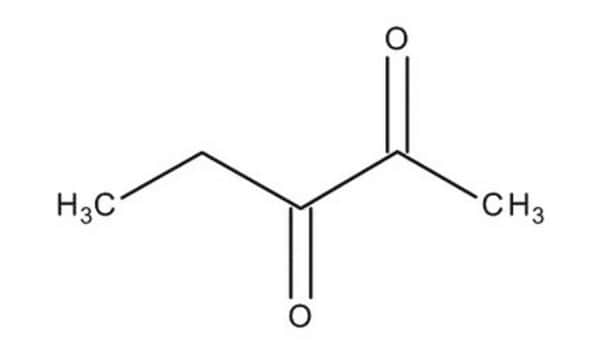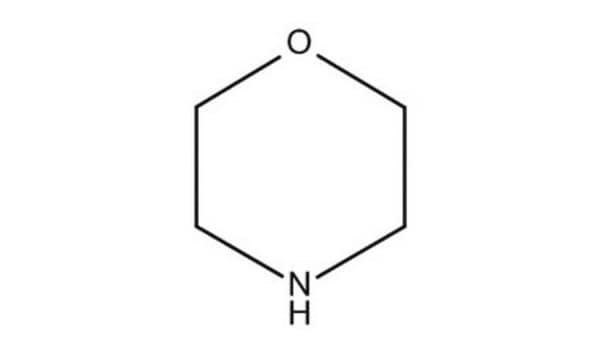8.03528
Diacetyl
for synthesis
Synonym(s):
Diacetyl, 2,3-Butanedione, 2,3-Butadione, Dimethyldiketon, Dimethylglyoxal
About This Item
Recommended Products
vapor pressure
52 hPa ( 20 °C)
Quality Level
Assay
≥97.0% (GC)
form
liquid
autoignition temp.
365 °C
potency
1580 mg/kg LD50, oral (Rat)
>5000 mg/kg LD50, skin (Rabbit)
expl. lim.
2.4-13.0 % (v/v)
bp
89-90 °C/1013 hPa
mp
-2 °C
transition temp
flash point 7 °C
density
0.99 g/cm3 at 20 °C
storage temp.
2-8°C
SMILES string
O=C(C)C(=O)C
InChI
1S/C4H6O2/c1-3(5)4(2)6/h1-2H3
InChI key
QSJXEFYPDANLFS-UHFFFAOYSA-N
Application
- Photosensitizer in Synthesis: Discusses diacetyl′s role as a non-toxic, readily available "traceless" photosensitizer in metal-free cross-dehydrogenative coupling reactions, highlighting its versatility and economic benefits (Huang et al., 2019).
- Detection in E-cigarettes: Investigates diacetyl as a precursor to hazardous emissions in e-cigarette liquids, providing insights into the health risks associated with its use in vaping products (Vas, Porter & McAdam, 2019).
- Antimicrobial Activity: Explores the synergistic antimicrobial properties of diacetyl combined with reuterin against foodborne pathogens, emphasizing its potential for enhancing food safety (Langa et al., 2014).
- Coffee Industry Exposure: Details exposure levels to diacetyl and other volatile organic compounds in coffee roasting and café settings, discussing occupational safety measures and health implications (LeBouf et al., 2020).
Analysis Note
Density (d 20 °C/ 4 °C): 0.984 - 0.987
Identity (IR): passes test
Signal Word
Danger
Hazard Statements
Precautionary Statements
Hazard Classifications
Acute Tox. 3 Inhalation - Acute Tox. 4 Oral - Eye Dam. 1 - Flam. Liq. 2 - Skin Irrit. 2 - Skin Sens. 1 - STOT RE 2 Inhalation
Target Organs
Respiratory system
Storage Class Code
3 - Flammable liquids
WGK
WGK 2
Flash Point(F)
44.6 °F - closed cup
Flash Point(C)
7 °C - closed cup
Certificates of Analysis (COA)
Search for Certificates of Analysis (COA) by entering the products Lot/Batch Number. Lot and Batch Numbers can be found on a product’s label following the words ‘Lot’ or ‘Batch’.
Already Own This Product?
Find documentation for the products that you have recently purchased in the Document Library.
Customers Also Viewed
Our team of scientists has experience in all areas of research including Life Science, Material Science, Chemical Synthesis, Chromatography, Analytical and many others.
Contact Technical Service















